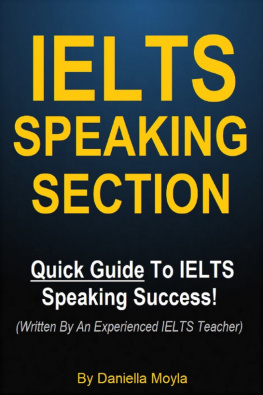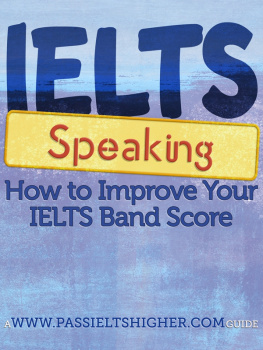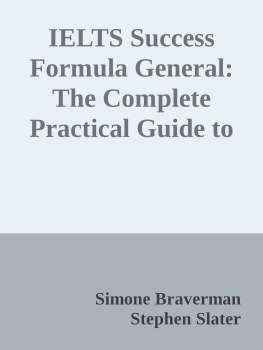IELTS GRAMMAR GUIDE
23 Grammar Rules You Must Know To Pass The IELTS
By Tim Dickeson
Publishedby SanbrookPublishing
SmashwordsEdition
Copyright 2014Tim Dickeson
This ebook is licensed for your personalenjoyment only. This ebook may not be re-sold or given away toother people. If you would like to share this book with anotherperson, please purchase an additional copy for each recipient. Ifyoure reading this book and did not purchase it, or it was notpurchased for your use only, then please return to Smashwords.comand purchase your own copy. Thank you for respecting the hard workof this author.
*****
All rightsreserved.
Limits ofLiability / Disclaimer of Warranty:
Theauthor and publisher of this book and the accompanying materialshave used their best efforts in preparing this book. The author andpublisher make no representation or warranties with respect to theaccuracy, applicability, fitness, or completeness of the contentsof this book. They disclaim any warranties (expressed or implied),merchantability, or fitness for any particular purpose. The authorand publisher shall in no event be held liable for any loss orother damage, including but not limited to special, incidental,consequential, or other damages.
This manualcontains material protected under International and FederalCopyright Laws and Treaties. Any unauthorized reprint or use ofthis material is prohibited.
IELTS isjointly owned by British Council, IDP: IELTS Australia and the University of CambridgeESOL Examinations (Cambridge ESOL).
ISBN:9781311832047
*****
Table ofContents
*****
Why You Need To Read This Book
Did you know that 25% of your overall IELTSscore is weighted based on your grammar accuracy and use?
This means that you could potentially lose25% of your score simply by using bad grammar!
If you are about to take the IELTS examsoon, then you must review your grammar, especially the rules thatare most commonly used in the IELTS.
If you look at the scoring criteria that theIELTS evaluators use, you will see that part of their scoringcriteria looks at how well you use the different grammar principlesand how accurate you use them.
So, apart from learning how to develop highscoring answers in the writing and speaking sections andunderstanding the correct strategies for answering the reading andlistening questions, you MUST correct your grammar to ensure youachieve a high score.
This book has been especially written tohelp you review, understand and correct the most common grammarrules used in the IELTS exam.
For each IELTS grammar rule, you willlearn:
T he fundamental use of the rule
How to apply and use the rule (with simpleexplanations and examples)
When to use it (what questions andsituations are best used for the rule)
Important tips (for how to use the rulecorrectly)
Signalling words
So, if you are about to take the IELTS examsoon, you MUST NOT FORGET to review your grammar, because it couldmean the difference between achieving the score you need ornot!
IELTS Grammar Rule No. 1
Simple Present
Description
Simple presentis used to express the idea that an action is continuously repeatedor an action that happens usually. The action can be a daily event,a habit or something that often happens.
How To UseIt
Structure : VERB + s/es(in the third person)
Example: She speaks English,I like salad,They dont like fish
Explanation: TheSimple present is easy to conjugate with Regular verbs because they all finish in the same form.For example, the verb to eat:
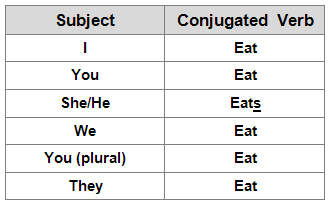
However, Irregular verbsdo NOT follow this pattern. For example, the verb tobe:
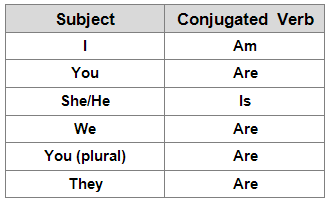
When To UseIt
Here are the 4 ways to use it :
Repeated actions > I go to the gym on Monday and Thursday
Permanent states > The Sun rises in the morning
Scheduled events in the near future > The plane leaves at 6 am tomorrow
Now (non-continuous) > I am here now
SignallingWords
Frequency Adverbs: Always, never, sometimes, Once/Twice aweek/month etc .
ImportantTips
Many peoplemake the mistake of combining the present continuous with thesimple present.
These forms are INCORRECT :
She running fast
I am go to the mountains
These forms are CORRECT :
She is running fast
I am going to the mountains
IELTS Grammar Rule No. 2
Simple Past
Description
Simple past isused to express an action that started and finished at a specifictime in the past.
How To UseIt
Structure: VERB+ ed (regular verbs), or other forms for irregularverbs
Example: She spoke English,I liked thesalad, They didnt like the fish
Explanation: Below it is shown how the verb changes for a Regular verband for an Irregular verb
Regular verb(Simple Past)
Verb totalk

Irregular verb(Simple Past)
Verb tospeak

When To UseIt
Here are the 5 ways to use it:
Completed action in the past > Last year,she travelled to Japan
A series of completed actions > We talked on the phone, thenmet for coffee and later went to the movies
Duration in the past > They lived in Brazil for 5years
Habits in the past > I never played the piano
Past facts or generalisations > I was a shy child
SignallingWords
Yesterday, 2 minutes ago, in 1990, the other day, lastFriday, etc .
ImportantTips
Words endingin ed are often pronounced incorrectly, simply because peoplearent aware of the following rules.
Rule 1: Allwords that have the last consonant as a t or d before ed mustbe pronounced with the ed as a separate syllable.
For example: (Pronunciation with syllables)
Translated > (Trans la ted)
Needed > (Nee ded)
Deposited > (De pos i ted)
Rule 2: Allother words that have the last consonant other than t or dbefore ed must be pronounced without the e, and the d iscombined with the previous syllable.
For example: (Pronunciation with syllables)
Looked > (Lookd)
Watched > (Watchd)
Liked > (Likd)
Tip: For allwords where Rule 2 applies, it is easier to think of the d as at sound. For example; talked > (talkt)
Note: See howthe e is not pronounced.
IELTS Grammar Rule No. 3
Present Perfect
Description
The presentperfect is used to say that an action happened at an unspecifiedtime before now. The exact time is not important.
How To UseIt
Structure: Have/has + past participle of the main verb
Example : She has always spoken English, I have never liked salad,They have liked fish for along time
Explanation: Youcannot use the present perfect with specific time expressions,like; yesterday, one year ago, last week, when I was a child, whenI lived in Australia, at the moment, that day etc.
You canhowever use the present perfect with unspecific expressions, like;never, ever, several times, once, many times, before, alreadyetc.
Next page





